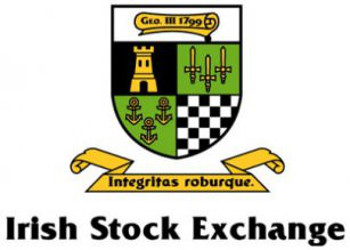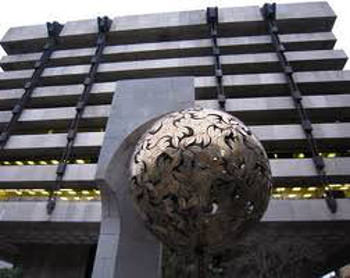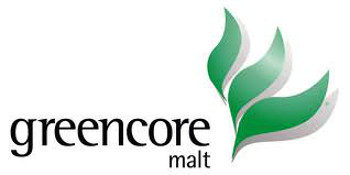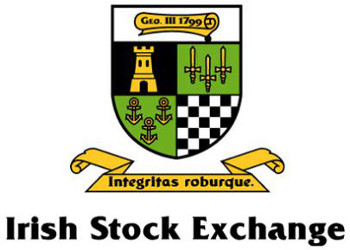This Week In Business
Print’s not dead. How Hearst is using social to power-up its papers.
Analizo launches Europe's first algorithm-as-a-service, bringing robo-investing capabilities to the wealth management industry
Applegreen wins prestigious European SME Award
Mimaki Tx300P-1800 already proving a Fashionable Choice
Irish Stock Market
Applegreen wins prestigious European SME Award
Star of 2016 award won by Applegreen Applegreen, the #1 motorway service area operator in…Irish Stock Exchange Quarterly Statistics Q3 2016
Q3 2016 statistics show over 35,000 securities listed on Irish Stock Exchange markets…ISE shows growth
Irish Stock Exchange listing figures grow to over 35,000 securities Quarterly statistics…Irish Stock exchange extends to 28 companies
Dalata Hotel Group joins the ISE’s Main Securities Market Dalata Hotel Group (Dalata),…#IPOready companies graduate from ISE leadership programme
High-potential companies have graduated from #IPOready #IPOready is the Irish Stock…Quarterly Statistics - Irish Stock Exchange
Q1 2016 statistics show 34,382 securities listed on ISE markets. Main headlines: Listings…ISE The Place To Be!
Irish Stock Exchange wins No.1 slot in Great Place to Work Awards. Would you like a great…Venn Life Sciences Joins The ESM
Adding a euro quotation for investors. Venn Life Sciences, the growing Contract Research…
World Economy
Print’s not dead. How Hearst is using social to power-up its papers.
The Newspaper business is dead? Don’t tell that to Hearst. By Brett Lofgren | September…Press Release From ISE
ISE and NASDAQ OMX announce intention to bring Dual ISE/US Market Access to Irish…Sappi First-Quarter Profit Falls
Company says result is due to paper and pulp price decline. Sappi Ltd., the world’s…How global manufacturing is changing.
Ireland is changing and the savvy business has to be aware of changing global trends.3D…High Consumption Foodstuffs in DRC:
High Consumption Foodstuffs in DRC: Where Are the Surpluses and Deficits? By Dr…Xerox wins print contract for UK Government
Xerox to deliver cost efficiencies in print services to UK public sector The UK Cabinet…Disposable income drops
New figures just released show that household disposable income in Ireland fell by 0.4…Ireland’s richest 300 worth €62bn
The 300 richest people in Ireland are now worth more than €62bn. The figure is staggering…
Business & Finance
Applegreen wins prestigious European SME Award
Irish Stock Exchange Quarterly Statistics Q3 2016
ISE shows growth
Irish Stock exchange extends to 28 companies
#IPOready companies graduate from ISE leadership programme
Quarterly Statistics - Irish Stock Exchange
World Stock Market
Hans‐Ole Jochumsen re‐elected as FESE President
Euro rates fixed – but for how long?
GLOBAL STOCKS and COMMODITIES
Snapshot of Irish shares and European stocks over Christmas
Markets surge on Central Banks' intervention
U.S. Stocks Update Wednesday 23rd November 2011
Economy, Tenders & Invenstment
Prior information notice of tender.
Tender Opportunity Here at DPNlive, we are always looking for business opportunities for…Print tenders
Want to do the printing for the Houses of the Oireachtas? Below is a table of three…
- Details
- Written by Administrator
- Parent Category: Business and Finance
- Category: Irish Stock Market
 In 2008, Ireland went down in history as the first major victim of the widespread credit crunch that central banks and governments continue to grapple with today.
In 2008, Ireland went down in history as the first major victim of the widespread credit crunch that central banks and governments continue to grapple with today.
That year Ireland’s ISEQ closed down 66 per cent, its worst performance since the Irish Stock Exchange opened in 1793.
Last year the situation worsened. The country was downgraded to junk status, resulting in Irish 10-year bond yields soaring to a record 14 per cent.
Now as we enter the fourth year of austerity, the general consensus for the eurozone is still one of despair. Only last month S&P downgraded nine member states including Italy, Spain and Portugal.
What has become of the Irish economy since 2008? Talk now is of another global recession looming – so is Ireland heading for a new downward spiral or have its fortunes improved?
Everyone knows the facts at this stage. Years of overspending during the Celtic Tiger boom inevitably led to Ireland becoming the first eurozone state to enter into a recession. When the property bubble finally burst, Irish banks went bankrupt because bad loans were never repaid. This eventually led to an insolvent government, forcing the EU to hand Ireland an €85bn bailout in November 2010 to prevent other member states from the same fate. It didn’t work. And as we all know too well the euro zone debt crisis escalated.
While Ireland has recently had to endure the harshest budgets in its history, surprisingly things seem to be on the up.
As mentioned previously on DPNLive (January 20th) following a successful European Financial Stability Facility (EFSF) bond auction in the first week of 2012 demand for three-year bonds was so strong it actually outstripped supply. Good news for the country.
The money raised will support Ireland and Portugal, which jointly need €24bn funding this year alone. On another positive note the country returned to positive growth in 2011. This resulted in a strong Irish bond market and ended up as one of the best performing markets that year.
Looking at the total return of a selection of JPM sovereign bond indices in 2011, in local currency terms Ireland returned 11.07 per cent. The UK came in with 16.8 per cent, Australia managed 14.4 per cent but although Ireland didn’t hit those dizzy heights it certainly outperformed other countries such as 6.6 per cent by Spain and -59 per cent by Greece.
The political will to bring the deficit down in Ireland is strong and reflects well on the country, compared with other peripheral nations.
Commentators still advise caution around Irish bonds despite the recent positive trends, however.
Copyright © 2011, DPNLIVE – All Rights Reserved
- Details
- Written by Administrator
- Parent Category: Business and Finance
- Category: Irish Stock Market

Trading volumes on the ISE (Irish Stock Exchange) rose by 14.2 per cent in 2011, with more than 2.4 million trades over the year, according to its annual report.
Average trades per day remained steady at over 10,000 in each of the last two quarters of 2011.
Interestingly, the market capitalisation of companies included in the ISEQ indices rose by more than €20 billion during the last quarter, reaching €86.9 billion at the end of December 2011, an increase of 32.1 per cent in Q4 while over the calendar year the increase was 80.7 per cent.
Average daily turnover in Irish equities was down slightly to €131 million from €133 million in Q4, while overall turnover fell to €8.2 billion from €8.8 billion in Q4 due to the number of days in the period (63 days compared to 66 days in Q3).
Overall the report said that in 2011 the ISEQ General index rose by 5.2 per cent while other indices remained at about the same levels logged at end 2010. The ISEQ Financial index, the Small Cap and ESM index all fell by more than 15 per cent in 2011.
The ISE said that all equity indices, with the exception of the ISEQ Small Cap, showed growth in Q4, with increases ranging from 5.3 per cent to 31 per cent. It said the suite of ISEQ 20 indices, which represent 20 of the largest and most liquid equities quoted on the ISE, performed particularly well during the period with the ISEQ 20 up 15.5 per cent, the ISEQ 20 Capped index growing by 11.7 per cent and the ISEQ 20 Leveraged index rising by 31 per cent. The ISEQ General and the ISE Overall indices also showed double digit growth in the fourth quarter of 2011.
As expected full year turnover and trade statistics in Irish Government bonds and Treasury bills were down 73.4 per cent and 48.7 per cent respectively compared to 2010, an obvious reflection on the Government’s decision to exit the bond markets in Q4 2010. However, while market capitalisation of these bonds and Treasury bills fell back 8.6 per cent in Q4 they remained largely stable year on year with a value of €73.4 billion at end December 2011, just showing a 1.9 per cent drop in value against 2010.
It added that in the last quarter of 2011, turnover in Irish Government securities returned to the levels experienced earlier in the year with turnover coming in at €17.3 billion (Q3 – €23.1 billion). Daily average turnover in Q4 was €274 million, compared to €351 million in Q3. Deal numbers in the last quarter also reflected lower activity levels, with the number of trades being just over half the levels experienced in Q3 of 2011.
One further extract from the ISE report said the impact of challenging conditions in international capital markets remained a factor in the level of fund and debt securities admitted to listing on its markets. This was born out by the number of new listings of funds and sub funds was 80 in Q4 (Q3 -113) with the level of debt tranches admitted to listing at 518 for Q4 compared to 548 for Q3.
Copyright © 2011, DPNLIVE – All Rights Reserved
- Details
- Written by Administrator
- Parent Category: Business and Finance
- Category: Irish Stock Market
 Under a new ‘Market Abuse Regulation’ from the European Commission the Central Bank is to take over the investigation of allegations of insider trading and market manipulation. Up to now this has been carried out by the Irish Stock Exchange.
Under a new ‘Market Abuse Regulation’ from the European Commission the Central Bank is to take over the investigation of allegations of insider trading and market manipulation. Up to now this has been carried out by the Irish Stock Exchange.
The old regulation (The 2003 Market Abuse Directive), attempted to clamp down on abusive practices such as insider trading, and it required every EU state to have an expert authority to administer the directive's powers.
Under Irish law, the Central Bank of Ireland was empowered to devolve these powers to investigate alleged market abuses. It made a decision to choose the Irish Stock Exchange to carry out this role, which it has carried out on behalf of the Central Bank since 2005.
However under the new directive this function is now being incorporated back into the Central Bank. The move is connected to the new Market Abuse Regulation, which is an attempt to update what is seen as an outdated and ineffective old regulation.
After examining the old legislation the Commission found that enforcement of the old directive was not particularly good. It concluded that what was needed was a number of new measures to give the regulation more bite. Amongst a number of changes it decided to propose was stronger investigative powers, and offences in criminal law, powers that would not be appropriate to devolve to a non-state body such as the Irish Stock Exchange.
Copyright © 2011, DPNLIVE – All Rights Reserved
- Details
- Written by Administrator
- Parent Category: Business and Finance
- Category: Irish Stock Market
 As announced previously Greencore has delisted from the Irish Stock Exchange, ending 20 years as a major component of the Dublin market.
As announced previously Greencore has delisted from the Irish Stock Exchange, ending 20 years as a major component of the Dublin market.
The company is leaving the ISEQ Index, at least temporarily, as it seeks full admission to the much bigger London Stock Exchange (LSE).
The move, flagged by the company last year, will take about two months to complete.
Greencore is expected to join the FTSE All Share and FTSE Small Cap indices no later than March 20th.
As part of the entry process, the company has to delist completely from the ISEQ at least temporarily to fulfill the LSE liquidity requirements. It may rejoin in the future, however, although no date has been set for when that might happen.
A spokesperson for Goodbody Stockbrokers said the move would not affect shareholders here who will be able to continue to trade their securities in the normal way as long as retail shareholders have a valid certificate.
Between now and March 20th the company will continue to trade on the London Main Market, where it has had a secondary listing for a number of years.
This move ends Greencore’s presence on the Irish exchange after going public in 1991 when it took over from Irish Sugar.
The last 18 months for the Patrick Coveney-led company have been tumultuous, with commentators talking about corporate intrigue for most of that time.
In October 2009, Greencore announced plans to merge with Northern Foods only to ultimately lose out on the deal to UK chicken magnate Ranjit Boparan.
Then last March it turned its attention to a tie-up with the UK sandwich and chilled foods maker Uniq, which cost it close to €138m. That deal seemed to put to bed any further speculation around the company. Not so! In November Greencore said it had been approached by an unnamed firm, believed to be private-equity giant Clayton Dubilier & Rice, about a possible takeover. Again, like so many other moves, those talks eventually broke down.
Although Greencore reported strong results last month, analysts have raised serious concerns about the concentration on the UK retail sector which they say has been decimated by the downturn.
A tale of two cities and economies! Can Greencore gain from the LSE or will its exposure to the UK and the stagnant Irish market lead to serious problems down the road?
Copyright © 2011, DPNLIVE – All Rights Reserved
- Details
- Written by Administrator
- Parent Category: Business and Finance
- Category: Irish Stock Market

Irish airlines were among the top performers after it emerged that Emirates had bought control of a UK online flight and hotel reservations firm, leading to speculation that this may lead to further expansion into Britain and Ireland.
Ryanair rose a healthy 4.2 per cent to close at €3.78, while rival Aer Lingus rose by nearly 4 per cent to come in at 66 cent at the close of business.
Packaging giant Smurfit Kappa finished the day up 3.85 per cent at €4.85 a share based on news that it had secured better prices for containerboard.
Building materials company Kingspan rose 3 per cent to €6.55 after it was reported in the German media that it had expressed an interest in buying a company in that country.
Building materials and DIY group Grafton saw significant trading as one Dublin trader reported two large purchases following chief executive Leo Martin’s retirement last week. Grafton’s stock closed up 2.6 per cent to 64 cent on the day.
Investors in FBD show faith in the company as the insurer rose 3 per cent to €6.70 despite recent news about the sale of its insurance brokerage business.
The only notable casualty on the day was financial company IFG which closed 4.8 per cent lower at €1 a share.
Bank of Ireland, the only Irish bank left on the main Irish market rose 3.66 per cent to 8.5 cent despite the Central Bank lifting the ban on short-selling. This move could have affected Bank of Ireland’s performance but appeared to have little or no effect.
Copyright © 2011, DPNLIVE – All Rights Reserved
Artisan Ireland
The Sweetest Thing
The Sweetest Thing. By Tom Byrne.Scratch the surface of Irish industry and you will find…Donegal’s Liquid Gold – Pure Rapeseed Oil
Donegal’s Liquid Gold – Pure Rapeseed Oil The healthy cooking oil favoured by Celebrity…A simply rural life at Waterfall Farm
by Hannah Bolger People are keen to connect with where their food is coming from…Tastefully Yours
Artisan producers of a delightful range of handmade chutneys, preserves, and…MILEEVEN Bees--Sarah's Honey
Mileeven Fine Foods was established in 1988 by my mum, Eilis Gough from her hobby of…Glebe Brethan Farmhouse Cheese
by David Tiernan In 1987 we won supplier of the Year Award from Drogheda and Dundalk…Graham Roberts - Connemara Smokehouse
My name is Graham Roberts and I live and work in a small fishing village, Aillebrack near…CIARA’S PANTRY: It's a Family Affair
By Ellen Neumann13th April 2012 Ciara O’Dowd grew up in the hospitality industry. Her…
















